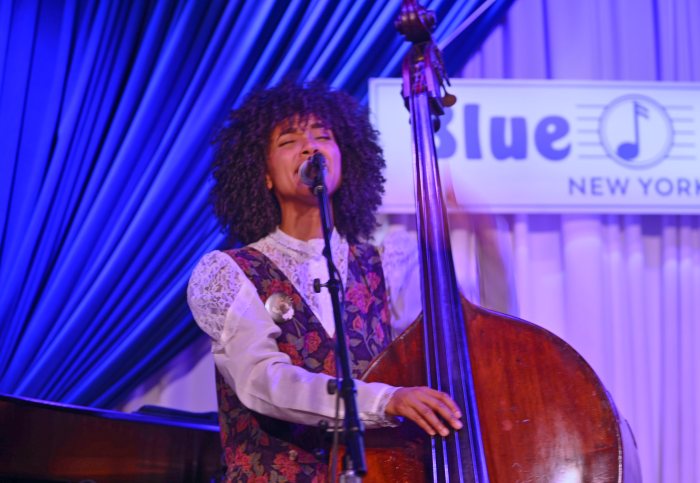“Orange is the New Black’s” Samira Wiley is driven as a performer to create authentic moments that reflect our society. Spoiler alert: In the Netflix show, after four seasons, Wiley’s lovable Poussey Washington was murdered by an inexperienced correction’s officer in the fictional correction’s facility of Litchfield. The storyline rocked fans, and opened the narrative of #BlackLivesMatter up for even more discussion.
Post “OITNB”, Wiley’s film “37,” in theaters and on demand on Friday, is a fictionalized version of the real-life murder of Kitty Genovese in Queens as told through the eyes of the 37 witnesses that acted as voyeurs to the crime instead of speaking up. In the film, Wiley plays Joyce, an expectant mother dealing with her own struggles after moving into the Kew Gardens apartment with her family.
amNewYork spoke with Wiley about “OITNB,” living in New York and her new film.
Your character’s demise on “Orange is the New Black” was so indicative of where our society is in terms of how we talk about race and police brutality in America. What kind of reception did you receive?
People were angry and they thought the death was unnecessary. They were mad that this happened on television. I heard a lot of people saying things like, “Why do we have to kill another black person on television? Why do we have to kill another gay person?” and I want people to be upset. I want people to be angry, but I want them to be angry about what’s happening in the actual world. I think that it’s our responsibility as artists to reflect our times.
Do you believe that a narrative like Poussey’s on “Orange is The New Black” can be an agent of change?
Absolutely. The characters we embody can have real emotional reactions and thoughts. I just want people to talk about it and have it be in their psyche, rather than have it something that can be ignored. I think bringing awareness to it in a show that is widely popular is a very smart decision, and I’m honored to be able to tell that story.
How has New York shaped your career as a performer?
Oh, goodness! I love New York. I lived in New York for the past 10 years, and it has completely shaped me as an artist. One of the things I’ve valued is creating a character, and for me that means being able to sit back and observe people. New York has some of the most interesting people in the entire world [Laughs]. You have all different kinds of people. I love the fast pace, the drive that I feel that everyone has and the diversity.
Are there any particular spots that you love to people-watch?
Definitely downtown, specifically the West Village area. I lived there for three months in the summer of 2008. I’ll always remember that time, [because] I met the most interesting people, and I ate the best food. I was 21 years old and it was the best summer ever.
For “37,” how did it feel to recreate this crime?
It was odd, but what we were trying to do is tell the story. Knowing that you’re recreating a story, you don’t have to necessarily be in the exact same place as long as your mind is in the right place and everyone is working toward the same goal. I feel like we accomplished that by the feeling on set.
It’s incredibly devastating that people didn’t speak up. We all want to think we would act fast in that situation, but I think that type of inaction speaks to our natural instinct as voyeurs.
Yeah, there’s a statistic that the more people are around witnessing a crime, the less people are going to speak up, because there’s an assumption that somebody else will. I always think there’s a fear of being the first person to report a crime. It’s amazing to me that those thoughts get in the way of helping a fellow human being. Why doesn’t the humanity kick in? I feel like it’s such an important conversation that needs to be had, especially with what’s going on in our country right now.
How did it feel to capture Queens in the 1960s?
The thing that really fazed me the most is the family that I was in. In the film, I’m pregnant and I have a husband, and we’re moving into a neighborhood where we’re the first black people moving in. … There’s a heightened sense of being aware of your own race. One of the reasons why our family chooses to not get involved and to not speak up is because of fear. If anyone is going to be blamed, it’s going to be the black family, or at least it’s that way of thinking. It’s a survival instinct and I think that, and along with The Supremes’ Diana Ross wig I had on, was also a highlight for me.
Did you get to hang out in certain areas of Queens while filming?
We didn’t have much time to hang out, because time is money. But when we were shooting we had lunch at a different place every day, and [we] got to know some of the people who lived in the neighborhood. I can’t imagine having something made about an experience that was a part of my life, so I’m sure for them it was pretty strange. But I think it’s exciting to be acknowledged, whatever your history is. If we don’t talk about it, you could lose it, and that event in particular should never be forgotten.





































